By Diane Bukowski
April 12, 2020, Updated April 13, 2020

The Old Wayne County Jail (Div. 2). Prisoners are demanding that their time there during the COVID-19 pandemic not become a death penalty.
DETROIT — Angry prisoners in the Wayne County Jail rose up on a prison visitation video April 10 (above). They said despite an official claim that only one prisoner out of 900 in the complex of three prisons has the coronavirus, many are sick and dying from it inside crowded, filthy, unsanitized cells.
“We’re not being tested, we’ve got no masks, everybody uses towels,” they reported. “This is cruel and unusual punishment, and we’re innocent until proven guilty. We’re not going to court appearances and not being allowed to see our attorneys.”
Scattering as a seriously ill prisoner staggered down the hall, coughing into his elbow, they said, “The whole time he’s been sick the medical staff ain’t came yet. We’re in Wayne County Division 2. We on a 10-man rock. We got two people in here sick. They ain’t checking us, not testing nobody. I’ve got asthma and there’s all types of medical problems in here, and they throw us in with sick people.”
At the conclusion of the video, they reported, “This is not a burner phone—this is legal.” The mother of one prisoner confirmed that the video was filmed during an official visit. She said guards have since lodged an assault complaint against her son and thrown him in the hole after isolating him for 72 hours. She says he has not been able to call her since, and neither he nor she has up-to-date information on his upcoming court appearances.
Jail officials have responded with threats instead of human concern for the prisoners, even egged on by reporters claiming the prisoners used a contraband cell phone despite their clear indication to the contrary. See the reports below.

Comparison of medical and N95 masks. Jail officials’ claim that N95 masks, which hospitals can’t even obtain, were passed out to prisoners, is questionable.
One Detroiter who asked not to be identified told VOD that police came to his home March 13 as he was returning with his wife and children from the grocery store, stocking up on food and supplies for the COVID-19 epidemic. They had an arrest warrant for outstanding child support, although county officials were allegedly weeding out people with non-felony cases.
He said they held him through March 21, first at Dickerson, then at the Old Wayne County Jail downtown.
“Detroit is out of their minds,” he said. “They weren’t taking people’s temperatures first at Dickerson, despite all this coronavirus. Detroit called Indiana, where I had another warrant, and took me to the old jail downtown for extradition. They’re not taking people’s temperatures there either or isolating them first for three days like Indiana was doing. At the old jail, they put me up on what they called ‘Quarantine Rock’ but it was not really quarantined. There was a guy there who had it, he was sneezing and coughing, and his eyes were all watery and puffy. There were eight of us, all in one cell.”
He said the jail was full of cockroaches, and the tunnel through which prisoners are taken for their court hearings is full of asbestos, mold, and water leaks.
“They don’t wipe the cells down before they throw you in,” he continued. “They’re not giving inmates gloves and masks, they’re wrong as hell,” he said. “Right now since I got out of jail, my wife won’t let me come home because of the kids. I have to stay somewhere else for 14 days. I can’t go home to my own kids, but I understand.”
Wayne County Sheriff Benny Napoleon told the Detroit News April 8, “We’ve released everybody we could possibly release without causing a danger component.” The News reported 430 inmates had been released, leaving only 953, those with felony cases or “thought to pose a threat to public safety.”

Sheriff Benny Napoleon
On the jail’s website, Napoleon’s claims are diametrically opposed to those of the prisoners.
“We have taken every step feasible to ensure that employees are protected to the greatest extent possible,” Napoleon says. “Every officer has been issued gloves, n95 masks, face shields, sanitizer wipes, hand sanitizer, Clorox and Lysol spray. Additionally, there are a select number of disposable hazmat suits available. Each of our jail divisions have been sanitized and we have restricted entry into the jails to inmates, employees and attorneys. All employees were offered testing over an eight (8) day period. Upon entry to the jails, everyone is required to have their temperature taken. Surgical masks have been distributed to inmates.”
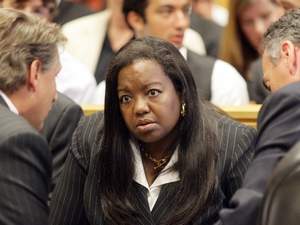
Wayne Co. Prosecutor Kym Worthy listening to top advisors.
Wayne County Prosecutor Kym Worthy said in a statement March 20, “We are clearly aware that the safety of the public is also paramount. As a result of the COVID-19 pandemic we have been working on the issue of administrative release of prisoners non-stop. There are many stakeholders that must be consulted – the Courts, the Sheriff’s Department, the Health Department, Prosecutors Office, a representative of the prisoners and their attorneys from Michigan Legal Services, jail personnel, medical personnel, and others. There are currently just under 100 people that have now been identified for Administrative Release.”
She also said that all prisoners with underlying health conditions were being identified, and assessed for release to facilities that could care for them.
Officials for the Michigan Department of Corrections have also said that before any prisoner is released there, he/she must go through a similarly lengthy and involved assessment. Their families say they hope their loved ones won’t die in the meantime.
MDOC spokesperson Chris Gautz says outright in the video below that the MDOC will not release prisoners accused of murder, rape or other assaultive crimes.

In 1978, Michigan abolished “good time” credits for prisoners, drastically increasing the total population in the prisoners. Good time was earned through positive behavior in prison and evidence of rehabilitation.
A large percentage of MDOC’s 37,000 prisoners have long passed their earliest parole release date. However, it is common practice for the parole board to keep them based solely on their original offense, not their progress in prison, according to a 2015 report from the Citizens Alliance on Prisons and Public Spending (Mi-CAPPS).
“Michigan’s prisoner population has grown from fewer than 7,900 in 1973 to over 43,000,” says the CAPPS report. “Corrections has gone from 1.6 percent of General Fund spending to nearly 20 percent. Today the budget of the Michigan Department of Corrections (MDOC) is roughly $2 billion.
The report says later, “. . . The Pew Center on the States found that in 2009, Michigan had the longest average length of stay of 35 states studied. Overall, Michigan prisoners served nearly 17 months more than the average. Assaultive offenders served 30 months longer than assaultive offenders nationally. Michigan’s 20-year rate of increase in length of stay far exceeded the growth rate of other states. Researchers can make no connection between increased length of stay and recidivism.”
Meanwhile, several prisoners have provided their own reports on the growth of the COVID-19 surge in Michigan prisons.
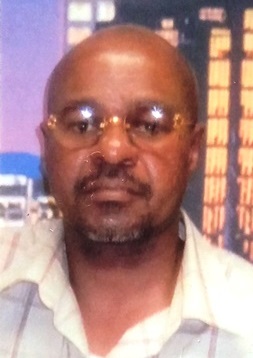
VOD staff writer Ricardo Ferrell
Ricardo Ferrell reported from Gus Harrison Correctional Facility in Adrian that 50 prisoners had been transferred there after they tested positive for COVID-19, and placed in a separate building. However, shortly afterwards two prisoners in housed in 4-6 men “cubes” suddenly came down with high fevers and tested positive for COVID. All the occupants of their units were quarantined in segregation. Others have reported that regular transfers from other prisons continue, followed by upspikes in positive COVID cases.
Ferrell sent a copy of an official update given to prisoners by the administration on numbers of COVID cases and deaths throughout MDOC. The report was clearly skewed. It said only 9 cases had been reported at Parnall Correctional Facility in Jackson, MI, contradicted by the report from Channel 7 above on 100 prisoners testing positive at Parnall Correctional Facility in Jackson, MI.
MICHIGAN PRISONS LACK STRATEGY IN COVID-19 BATTLE; PANDEMIC NUMBERS MUCH LARGER THAN REPORTED
by Efrén Paredes, Jr.
http://Bitly.com/FreeEfren
April 12, 2020
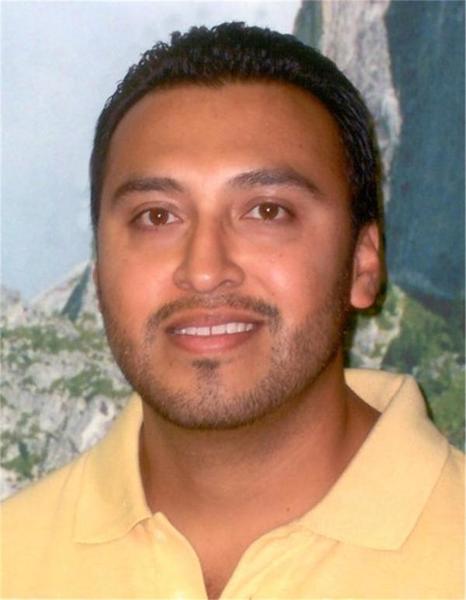
Efren Paredes, Jr.
Over the weekend during a 24-hour period ambulances visited the Lakeland Correctional Facility (LCF) twelve times to transport people housed at the prison to the hospital who exhibited advanced symptoms of COVID-19.
During the past week dozens of incarcerated people have tested positive for the disease. An even larger number of prisoners have sought medical care for COVID-19 symptoms and been turned away by Health Care staff who have been overwhelmed by requests for help.
According to reports from several people housed in the four pole barn open dorm housing units, many people housed there are experiencing the inability to smell or taste — early symptoms of COVID-19 infiltrate.
They state that when complaining about symptoms of the disease, even if they are experiencing multiple symptoms, unless they have a fever or can’t breathe Health Care staff will not provide them assistance or a COVID-19 test.
Medical assistance, COVID tests repeatedly denied to syptomatic prisoners; quarantined prisoners back in chow hall with hundreds of others
There have been reports about an incarcerated person exhibiting a dry cough, dizziness, and vomiting that was returned to his housing unit after being evaluated by Health Care staff. Another person was repeatedly denied medical assistance until defecating on himself.
Another widespread problem related to Health Care has been with follow-up care they have provided people in 14-day quarantine status who were in close contact with people who tested positive for COVID-19.

Prisoners in Lakeland Correctional Facility yard.
Health Care staff is supposed to check their vitals twice a day for two weeks while they remain in quarantine status, but they have only been doing it for a few days and stopping — buckling from being overwhelmed by the number of COVID-19 cases.
According to one incarcerated person a nurse told him, “I have to check vitals 200 times a day on my shift. We can’t keep this up anymore. If you have any symptoms just let us know.” It was the last time his vitals were checked.
People being quarantined were also supposed to have packaged meals delivered to their housing unit so they didn’t go to the dining hall and have contact with hundreds of other people. That, too, was short lived.
After complaints from Food Service staff that it was costing too much to package the food they stopped sending the meals and the quarantined people resumed eating with everyone else in the dining hall, potentially exposing them to COVID-19 if they are infected with it.
These actions have cratered what little remaining confidence many incarcerated people had in the ability of Health Care Services to help them. It has also reinforced their long held beliefs about the inadequate and substandard care they have been subjected to for many years.
Rising tension and frustration among prisoners
The rising tension and frustration is palpable in areas of the prison where large numbers of people are feeling that their health and safety is being ignored, and anecdotally the COVID-19 viral load appears to be silently stalking everyone in its path.
Morale is at an all time low and people are expressing a deep sense of distress and despair, particularly elderly people and those afflicted with morbidities which make them highly vulnerable to COVID-19.

Graduating class of MDOC prisoners. MDOC had recently begun allowing college classes again,
While the prison has suspended all educational classes, religious services, and law library sessions to avoid the danger of people being in close contact, it continues maximizing the gathering of people in the largest available space at the prison (i.e., the dining hall).
The prison remains resistant to providing packaged meals to people rather than feeding them in the crowded dining hall in close proximity to one another, making the cost of meal packaging a priority over saving lives.
Nearly 70 prisoners, 18 staff at LCF have tested positive; 2 prisoners have died during past eight days; only the tip of the iceberg
This brings us to the latest data. LCF now has nearly 70 prisoners and 18 staff members who have tested positive for COVID-19. Two incarcerated people have also died of the disease at the prison during the past eight days.
 With potentially hundreds of people at the prison infected with COVID-19 the number of people being hospitalized for urgent care is expected to continue surging. So is the number of people who succumb to COVID-19.
With potentially hundreds of people at the prison infected with COVID-19 the number of people being hospitalized for urgent care is expected to continue surging. So is the number of people who succumb to COVID-19.
There is a need for widespread testing at the prison if the MDOC has any intention to curb the spread of the disease. Sitting idly by as it ravages the prison daily or hoping it will eventually stop is not a strategy.
Experts have been clamoring for weeks about the importance of COVID-19 case identification, isolation, and testing regimes in areas where there are outbreaks. They have also stressed the need for contact tracing. Where these things are ignored or haphazardly utilized the results have proven fatal.
The MDOC is woefully failing in each of these areas. It is waiting far too long to quarantine people who are presenting COVID-19 symptoms and reserving testing only for cases that nearly require hospitalization.
This practice is allowing many potentially infected people to roam freely throughout prisons spreading infection to other prisoners and staff, and creating pockets of pathology. Unlike in society where infected people can self-isolate, incarcerated people don’t have that option.
Over 400 incarcerated people have tested positive for COVID-19 in prisons across the state and ten of them have died. The number of infected people doubled in just one week.
According to researchers, a single infected person with the disease can infect up to forty other people. If even half that number is true there will be thousands of COVID-19 cases propagated throughout Michigan prisons if mitigation and containment efforts do not rapidly improve.
This moment must be met with a real strategy and courageous, principled leadership if lives are to be saved.
(Efrén Paredes, Jr. is currently incarcerated at the Lakeland Correctional Facility. He is a blogger, thought leader, and social justice changemaker. His ongoing series about the COVID-19 crisis in Michigan prisons can be read at http://fb.com/Free.Efren.)
Related:
See Mi-CAPPS report at http://voiceofdetroit.net/wp-content/uploads/Executive_summary_10000_fewer_prisoners.pdf.
Activists including ACLU, Southern Poverty Law Center, others demand release of prisoners at high risk for COVID-10: https://www.latimes.com/world-nation/story/2020-03-19/la-na-coronavirus-prisons-safety
Sign petition to bring back Good Time for Michigan prisoners:
https://campaigns.organizefor.org/petitions/bring-back-good-time-in-michigan-s-prisons-hb-5666
“Correctional Facilities In The Shadow Of COVID-19: Unique Challenges And Proposed Solutions, ” Health Affairs Blog, March 26, 2020. at
https://www.healthaffairs.org/do/10.1377/hblog20200324.784502/full/


 “We have to ensure that we never return to the society that enabled this pandemic to emerge.”
“We have to ensure that we never return to the society that enabled this pandemic to emerge.” Glen Ford, BAR Executive Editor
Glen Ford, BAR Executive Editor


 Cooperation Jackson, the Mississippi-based “emerging vehicle for sustainable community development, economic democracy, and community ownership,” last week put out a call for a general strike to begin on May 1st — May Day — and a list of demands “that will transform our broken and inequitable society, and build a new society run by and for us – the working-class, poor, oppressed majority.” (See
Cooperation Jackson, the Mississippi-based “emerging vehicle for sustainable community development, economic democracy, and community ownership,” last week put out a call for a general strike to begin on May 1st — May Day — and a list of demands “that will transform our broken and inequitable society, and build a new society run by and for us – the working-class, poor, oppressed majority.” (See 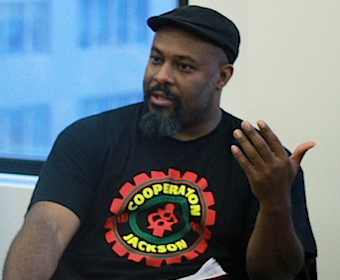



 BAR executive editor Glen Ford can be contacted at Glen.Ford@BlackAgendaReport.com .
BAR executive editor Glen Ford can be contacted at Glen.Ford@BlackAgendaReport.com .

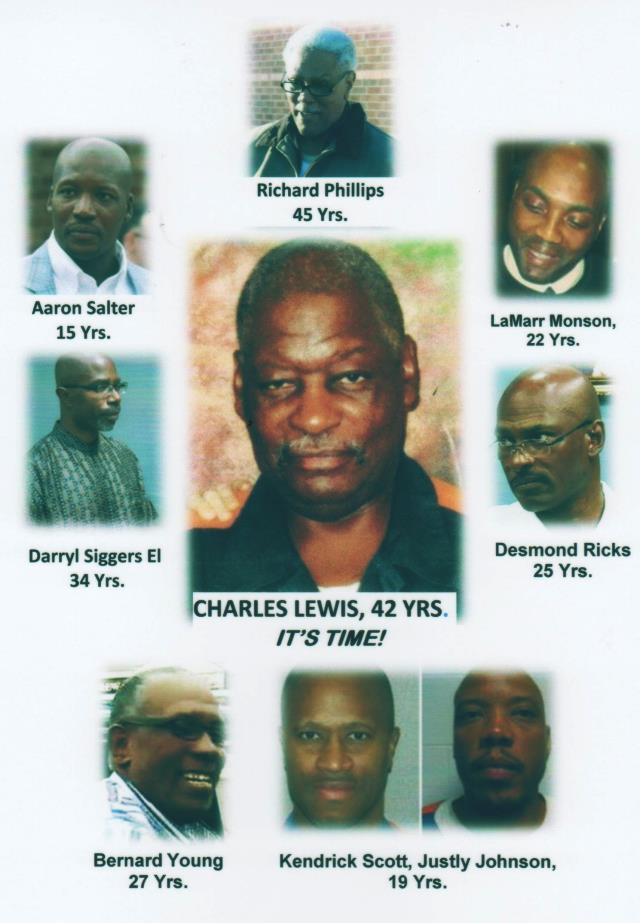




 SIGN PETITION TO FREE THELONIOUS SEARCY AS SUPPORT MOUNTS NATIONALLY AND WORLD-WIDE. STOP EXTENSIVE CORRUPTION IN MICHIGAN JUDICIAL SYSTEM, at
SIGN PETITION TO FREE THELONIOUS SEARCY AS SUPPORT MOUNTS NATIONALLY AND WORLD-WIDE. STOP EXTENSIVE CORRUPTION IN MICHIGAN JUDICIAL SYSTEM, at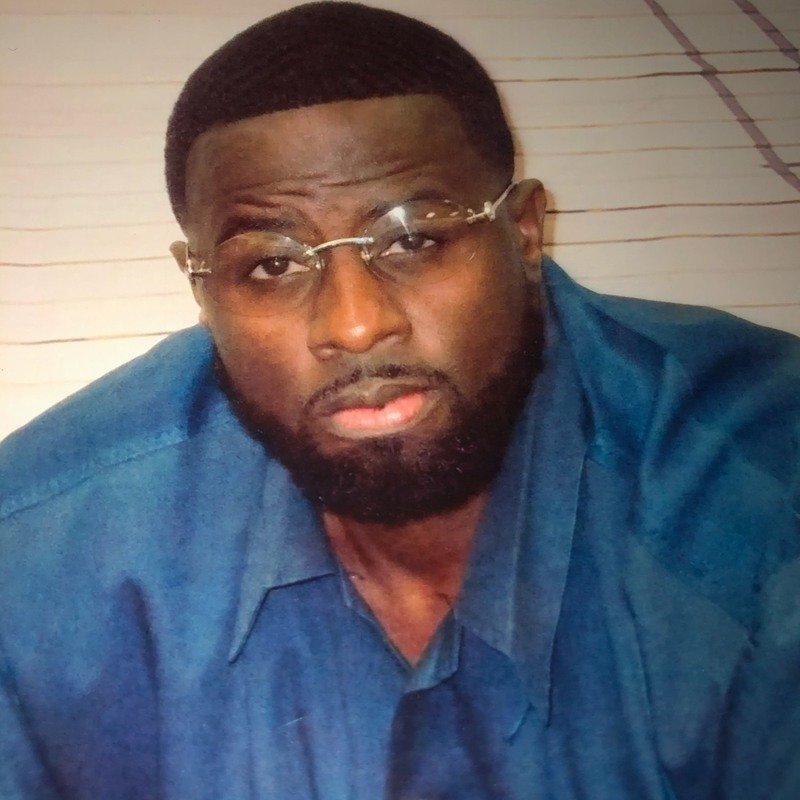
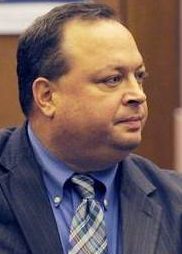

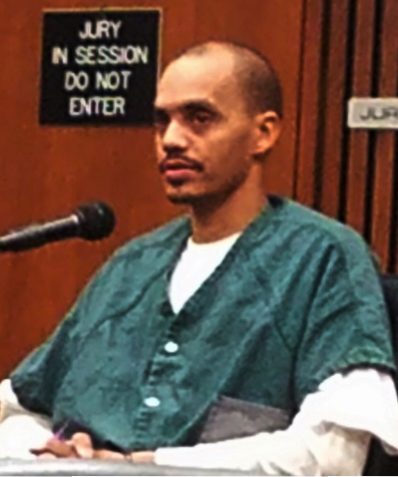
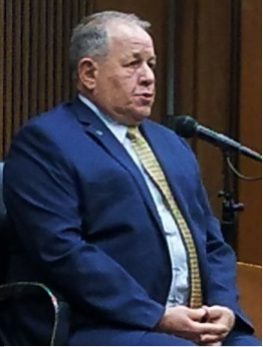
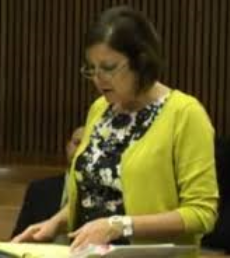



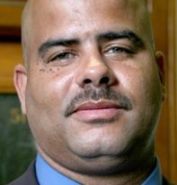
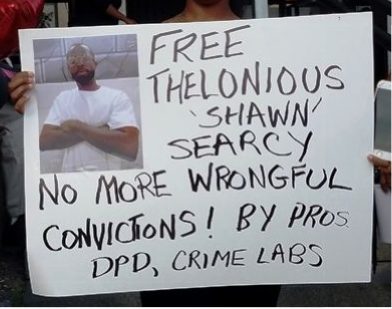
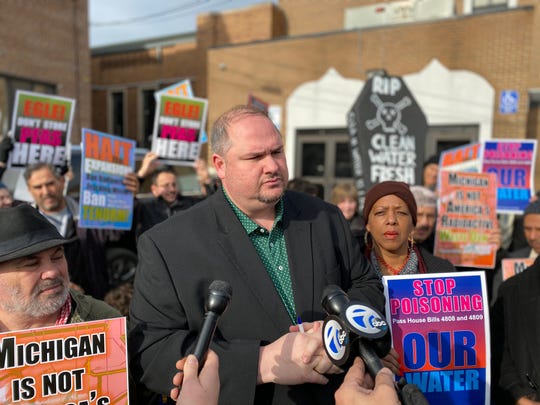


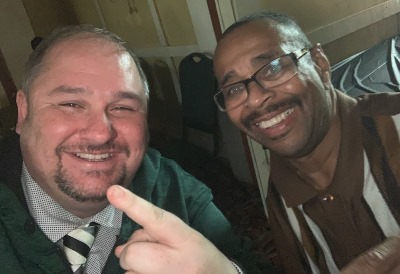

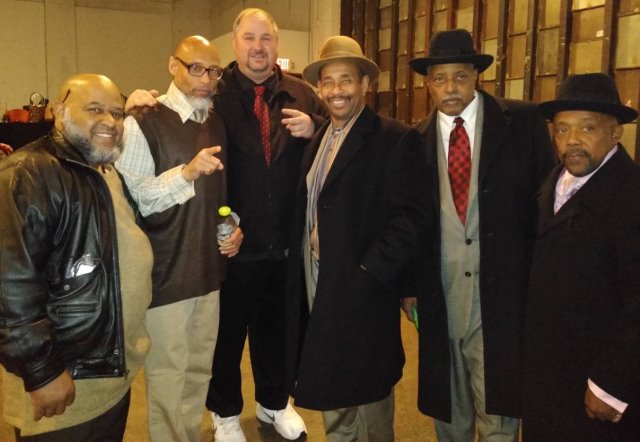



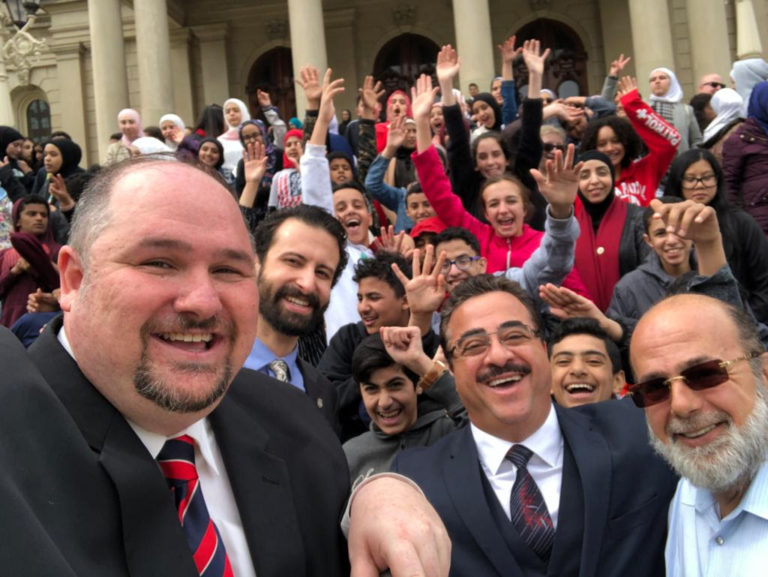
 Speaker of the Michigan House of RepresentativesLee Chatfield called Robinson “a tremendous friend and colleague.”
Speaker of the Michigan House of RepresentativesLee Chatfield called Robinson “a tremendous friend and colleague.”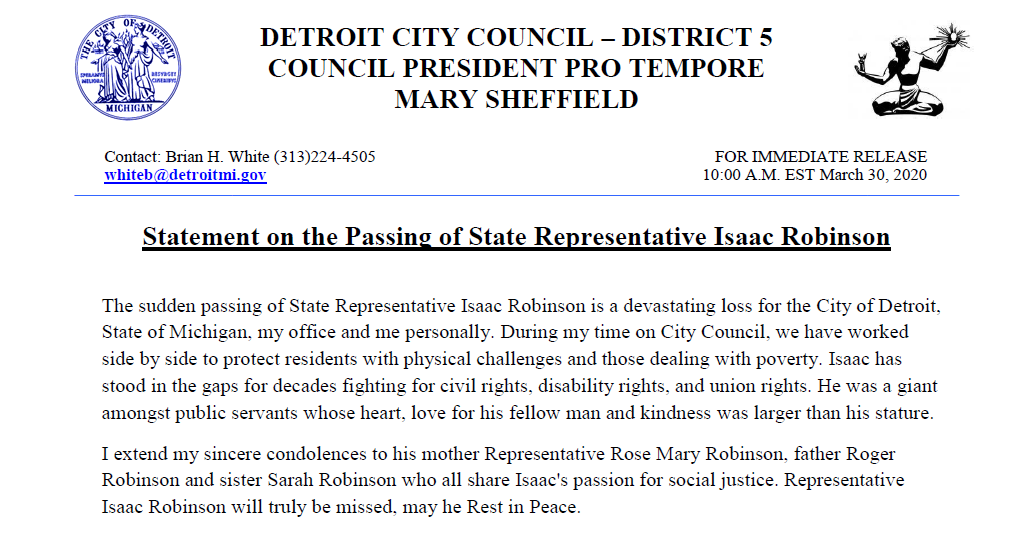

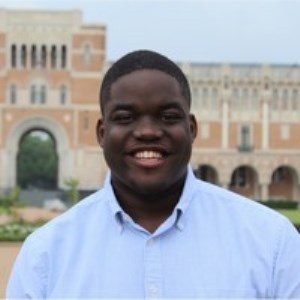

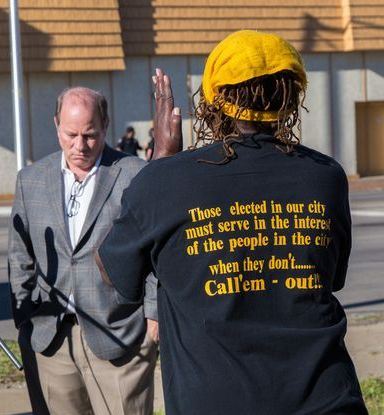











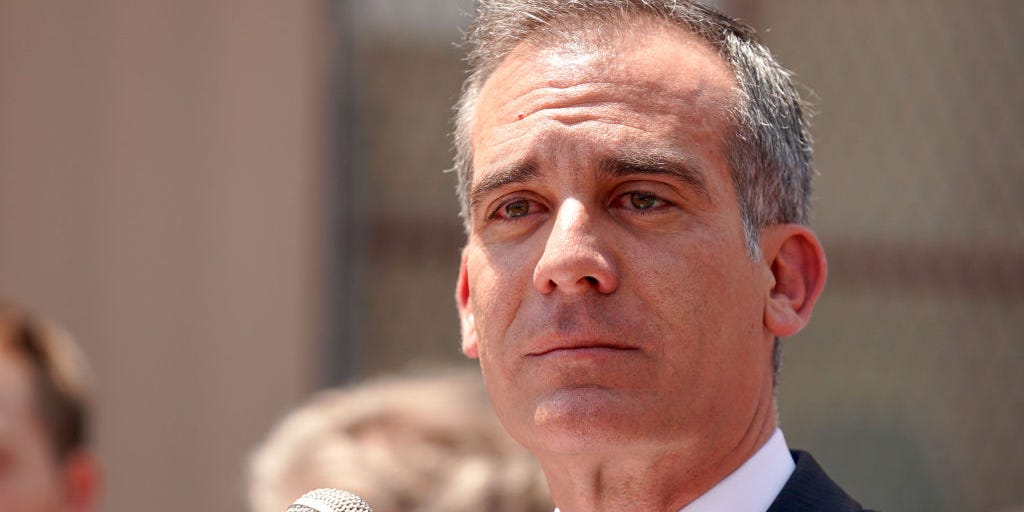
 Charles Davis
Charles Davis





